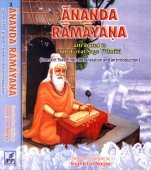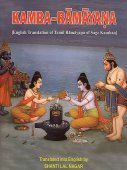Tadaka, Taḍāka, Tāḍakā, Ṭaḍakā: 17 definitions
Introduction:
Tadaka means something in Hinduism, Sanskrit, Marathi, Hindi. If you want to know the exact meaning, history, etymology or English translation of this term then check out the descriptions on this page. Add your comment or reference to a book if you want to contribute to this summary article.
In Hinduism
Purana and Itihasa (epic history)
Source: Cologne Digital Sanskrit Dictionaries: The Purana IndexTāḍakā (ताडका).—Wife of Sundā (Mārica, Vāyu-purāṇa) and mother of Mārīca;1 was killed by Rāma2

The Purana (पुराण, purāṇas) refers to Sanskrit literature preserving ancient India’s vast cultural history, including historical legends, religious ceremonies, various arts and sciences. The eighteen mahapuranas total over 400,000 shlokas (metrical couplets) and date to at least several centuries BCE.
Shaktism (Shakta philosophy)
Source: Google Books: ManthanabhairavatantramṬādaka (टादक) (or Kaṭāha) is the name of the Tree associated with Pūrṇagiri, one the eight Sacred Seats (pīṭha), according to the Yogakhaṇḍa (chapter 14) of the Manthānabhairavatantra, a vast sprawling work that belongs to a corpus of Tantric texts concerned with the worship of the goddess Kubjikā.

Shakta (शाक्त, śākta) or Shaktism (śāktism) represents a tradition of Hinduism where the Goddess (Devi) is revered and worshipped. Shakta literature includes a range of scriptures, including various Agamas and Tantras, although its roots may be traced back to the Vedas.
Shaivism (Shaiva philosophy)
Source: Brill: Śaivism and the Tantric TraditionsTaḍāka (तडाक) refers to “tanks” (filled with water), according to Kṣemarāja’s commentary on the Svacchandatantra verse 4.85.—Accordingly, “The mundane path is the observance according to śruti and smṛti. The sacred rites [consist of] such actions as bathing at a sacred site and giving away food. The meritorious acts are [the donations and setting up of] such things as wells, tanks (taḍāka) and monasteries for ascetics”.

Shaiva (शैव, śaiva) or Shaivism (śaivism) represents a tradition of Hinduism worshiping Shiva as the supreme being. Closely related to Shaktism, Shaiva literature includes a range of scriptures, including Tantras, while the root of this tradition may be traced back to the ancient Vedas.
General definition (in Hinduism)
Source: Wisdom Library: HinduismTaḍāka (तडाक) is a Sanskrit word referring to a “tank” (water pool).
Languages of India and abroad
Marathi-English dictionary
Source: DDSA: The Molesworth Marathi and English Dictionarytaḍaka (तडक).—ad (Imit.) Smartly, sharply, briskly, crackingly, swimmingly. Ex. hēṃ kāma ta0 cālalēṃ. 2 Readily, freely, unobstructedly. Ex. akabarī mōhōra sarvatra ta0 cālatī. 3 Completely, full, good. Ex. tō gāṃva ēthūna ta0 vīsa kōsa āhē. 4 Straight, right, directly. Ex. hā mārga ta0 puṇyāsa jātō. 5 Copiously, lavishly, exuberantly. It is used freely in enhancement of words expressing animated and unobstructed action or boundless profusion.
--- OR ---
taḍaka (तडक).—f (Imit.) A continued and vehement effort; a strain or stretch: (esp. at running.) v māra. Ex. tēthūna jī ta0 mārilī tōṃ ēthēṃ ubhā rāhilōṃ.
--- OR ---
taḍakā (तडका).—ad ind Smartly, sharply &c. See taḍaka ad.
--- OR ---
taḍakā (तडका).—m (Imit.) A blast of cold. 2 Activity, energy, smartness. 3 It is in many senses interchangeable with taḍākā. ta0 tōḍaṇēṃ To dun or importune rigorously; to urge or press worryingly.
--- OR ---
taḍākā (तडाका) [or खा, khā].—m (An imitative and fanciful formation from taḍa! taḍa! but very expressive, of unlimited application, and of universal currency.) A sounding blow or stroke. The whack! whack! crack! crack! (of a smart caning or whipping); the pelting or down-dashing (of a heavy shower); the banging, pealing, rattling (of volleys from cannon or muskets); the bustle, briskness, din and clamor (of an extensive business); the vehemence, violence, fury, clash, clatter (of a storm, a battle, a disputation); the force, fierceness, sharpness, rigor, ardor, severity, intenseness, (of cold, heat, rain, wind, a river-fresh or flood--thaṇḍīcā- unhācā-pāvasācā-vāṛyāñcā-nadīcā-taḍākhā); the animated course or full flow (of reading, reciting, studying, of singing, playing, sporting--paḍhaṇyācā-mhaṇa- ṇyācā-adhyayanācā-gāṇyācā-taḍākhā) &c. &c. It always expresses a progress (whether lit. or fig., whether of bodies or of business) rapid and vigorous, loud-sounding, or of imposing show. See under dhaḍākā the distinction drawn betwixt this word and that. ēkātaḍākyānēṃ At a stretch; at a go or run; by one vigorous and unpausing effort.
--- OR ---
tāḍaka (ताडक).—n A branch of the tāḍa.
Source: DDSA: The Aryabhusan school dictionary, Marathi-Englishtaḍaka (तडक).—ad Smartly. Readily. Straight.
--- OR ---
taḍakā (तडका).—m A blast of cold. Activity. ad Smartly.
--- OR ---
taḍākā (तडाका) [-khā, -खा].—m A sounding blow. Bustle. Vehemence. Severity.
Marathi is an Indo-European language having over 70 million native speakers people in (predominantly) Maharashtra India. Marathi, like many other Indo-Aryan languages, evolved from early forms of Prakrit, which itself is a subset of Sanskrit, one of the most ancient languages of the world.
Sanskrit dictionary
Source: DDSA: The practical Sanskrit-English dictionaryTaḍāka (तडाक).—A pond, pool.
-kā 1 A blow.
2) A bank, shore.
3) Splendour, lustre.
Derivable forms: taḍākaḥ (तडाकः).
--- OR ---
Tāḍakā (ताडका) or Ṭaḍakā (टडका).—
1) Name of a female fiend, daughter of Suketu, wife of Sunda and mother of Mārīcha. [She was changed into a fiend by the sage Agastya whose devotions she had disturbed. She was killed by Rāma when she began to disturb, the sacrificial rites of Viśvāmitra. Rāma was first unwilling to bend his bow against a woman, but the sage overcame his scruples. See R.11.2].
2) The large dark-green pumpkin.
Source: Cologne Digital Sanskrit Dictionaries: Edgerton Buddhist Hybrid Sanskrit DictionaryTāḍaka (ताडक).—m. (compare s.v. tāḍa, 2), key, or some kind of key: °kaṃ kuñcikāṃ ca tāvad dhāraya Divyāvadāna 577.21, 27; °kaḥ kuñcikā ca 578.11; tāḍaka-kuñcikāṃ (acc.; so read for ed. tāḍhaka°) Mūla-Sarvāstivāda-Vinaya iii.23.14. Cf. also tālaka.
Source: Cologne Digital Sanskrit Dictionaries: Shabda-Sagara Sanskrit-English DictionaryTaḍāka (तडाक).—m.
(-kaḥ) A pond or pool, one deep enough for the lotus. f.
(-krā) 1. A bank, a shore. 2. A blow. E. taḍ to beat, Unadi affix āka; also taṭāka and taḍāga.
--- OR ---
Tāḍakā (ताडका).—f.
(-kā) A female demon, killed by Rama.
Source: Cologne Digital Sanskrit Dictionaries: Benfey Sanskrit-English DictionaryTaḍāka (तडाक).—m. and n. A pond.
— Cf. taṭāka.
Source: Cologne Digital Sanskrit Dictionaries: Cappeller Sanskrit-English DictionaryTāḍaka (ताडक).—[masculine] killer; [feminine] ā [Name] of a Yakṣiṇī changed into a Rākṣasī and killed by Rāma.
Source: Cologne Digital Sanskrit Dictionaries: Monier-Williams Sanskrit-English Dictionary1) Taḍākā (तडाका):—[from taḍ] 1. taḍākā f. a stroke, [cf. Lexicographers, esp. such as amarasiṃha, halāyudha, hemacandra, etc.]
2) [v.s. ...] splendour, [Uṇādi-sūtra [Scholiast or Commentator]]
3) Taḍāka (तडाक):—m. n. (= taṭāka), a tank, pool, [cf. Lexicographers, esp. such as amarasiṃha, halāyudha, hemacandra, etc.]
4) Taḍākā (तडाका):—[from taḍāka] 2. taḍākā f. a shore, [cf. Lexicographers, esp. such as amarasiṃha, halāyudha, hemacandra, etc.]
5) Tāḍaka (ताडक):—[from tāḍa] m. a murderer, [Vikramāṅkadeva-carita, by Bilhaṇa xviii, 57]
6) [v.s. ...] a kind of key, [Divyāvadāna xxxvii]
7) Tāḍakā (ताडका):—[from tāḍaka > tāḍa] f. Name of a Yakṣiṇī (changed into a Rākṣasī by Agastya for having disturbed his devotions, afterwards killed by Rāma), [Rāmāyaṇa i, 26, 26ff. (G 27, 25 ff.); Harivaṃśa 218; Raghuvaṃśa xi, 14ff.; Vāyu-purāṇa ii, 6, 72 f.] (wife of Mārīca)
8) [v.s. ...] the large dark-green pumpkin, [Nighaṇṭuprakāśa]
Source: Cologne Digital Sanskrit Dictionaries: Yates Sanskrit-English Dictionary1) Taḍāka (तडाक):—[taḍā+ka] (kaḥ) 1. m. A pond. (kā) f. A bank; a blow.
2) Tāḍakā (ताडका):—(kā) 1. f. A female demon, or Rākshasī killed by Rāma.
[Sanskrit to German]
Sanskrit, also spelled संस्कृतम् (saṃskṛtam), is an ancient language of India commonly seen as the grandmother of the Indo-European language family (even English!). Closely allied with Prakrit and Pali, Sanskrit is more exhaustive in both grammar and terms and has the most extensive collection of literature in the world, greatly surpassing its sister-languages Greek and Latin.
Hindi dictionary
Source: DDSA: A practical Hindi-English dictionary1) Taḍaka (तडक):—(nf) the act or process of cracking; a crack mark; snap; split; fissure; -[bhaḍaka] ostentation, tawdry/tawdriness, pompousness.
2) Taḍakā (तडका):—(nm) day-break, dawn; cracking noise; a snap; seasoning, heated oil or ghee in which spices and onion, etc. are well-stirred and browned (to be administered as a relish to pulses, etc.)
3) Taḍāka (तडाक):—(nf) a cracking sound, snap, loud report, sound of a stroke or blow; -[phaḍāka] at once; swiftly; —[se] with a loud report; —[se jabāba denā] to answer back unhesitatingly/insolently, to retort.
4) Taḍākā (तडाका):—(nm) a loud report; crack, snap.
...
Kannada-English dictionary
Source: Alar: Kannada-English corpusTaḍāka (ತಡಾಕ):—[noun] a body of water either natural or artificially formed; a lake; a pond; a water tank.
--- OR ---
Tāḍaka (ತಾಡಕ):—
1) [noun] the grass Lipeocercis serrata.
2) [noun] a flogging instrument consisting of a lash attached to one end of a rod or stick; a whip.
3) [noun] a man who lashes.
Kannada is a Dravidian language (as opposed to the Indo-European language family) mainly spoken in the southwestern region of India.
See also (Relevant definitions)
Starts with (+5): Tadakabhadaka, Tadakaboma, Tadakadu, Tadakai, Tadakal, Tadakamudra, Tadakana, Tadakanem, Tadakani, Tadakaphadaka, Tadakaphadaki, Tadakaphala, Tadakara, Tadakaraparijnana, Tadakasa, Tadakasara, Tadakasavitri, Tadakashim Todanem-Dharanem, Tadakata, Tadakatadakim.
Ends with: Cheppu tadaka, Devatadaka, Kattadaka.
Full-text (+25): Tadaga, Tadakini, Devatadaka, Tadakaphala, Tadakin, Tadani, Cheppu tadaka, Marica, Tadagavat, Tadakasara, Tadakasavitri, Tadakayana, Suketusuta, Tadagada, Sundasuravadhu, Tadagabhavanotsarga, Tadagabhedaka, Drishvara, Tadika, Tadakaboma.
Relevant text
Search found 12 books and stories containing Tadaka, Taḍāka, Tāḍakā, Taḍaka, Taḍakā, Taḍākā, Tāḍaka, Ṭaḍakā; (plurals include: Tadakas, Taḍākas, Tāḍakās, Taḍakas, Taḍakās, Taḍākās, Tāḍakas, Ṭaḍakās). You can also click to the full overview containing English textual excerpts. Below are direct links for the most relevant articles:
Amarakoshodghatana of Kshirasvamin (study) (by A. Yamuna Devi)
Earth and its aspects < [Chapter 5 - Aspects of Nature]
Puranic encyclopaedia (by Vettam Mani)
Hanuman Nataka (critical study) (by Nurima Yeasmin)
Hanuman-Nāṭaka, Act 1 (summary) < [Chapter 3]
The Shiva Purana (by J. L. Shastri)
Chapter 9 - Boasting of Tāraka and fight between him and Indra, Viṣṇu, Vīrabhadra < [Section 2.4 - Rudra-saṃhitā (4): Kumāra-khaṇḍa]
The Garuda Purana (by Manmatha Nath Dutt)
Chapter CXLIII - The Ramayana < [Brihaspati (Nitisara) Samhita]
The Skanda Purana (by G. V. Tagare)
Chapter 30 - Rāma’s Life < [Section 2 - Dharmāraṇya-khaṇḍa]
Chapter 14 - Destruction of Viṣṇu’s Head < [Section 2 - Dharmāraṇya-khaṇḍa]
Chapter 34 - Rāma’s Copper-plate Grant to Brāhmaṇas < [Section 2 - Dharmāraṇya-khaṇḍa]
Related products

